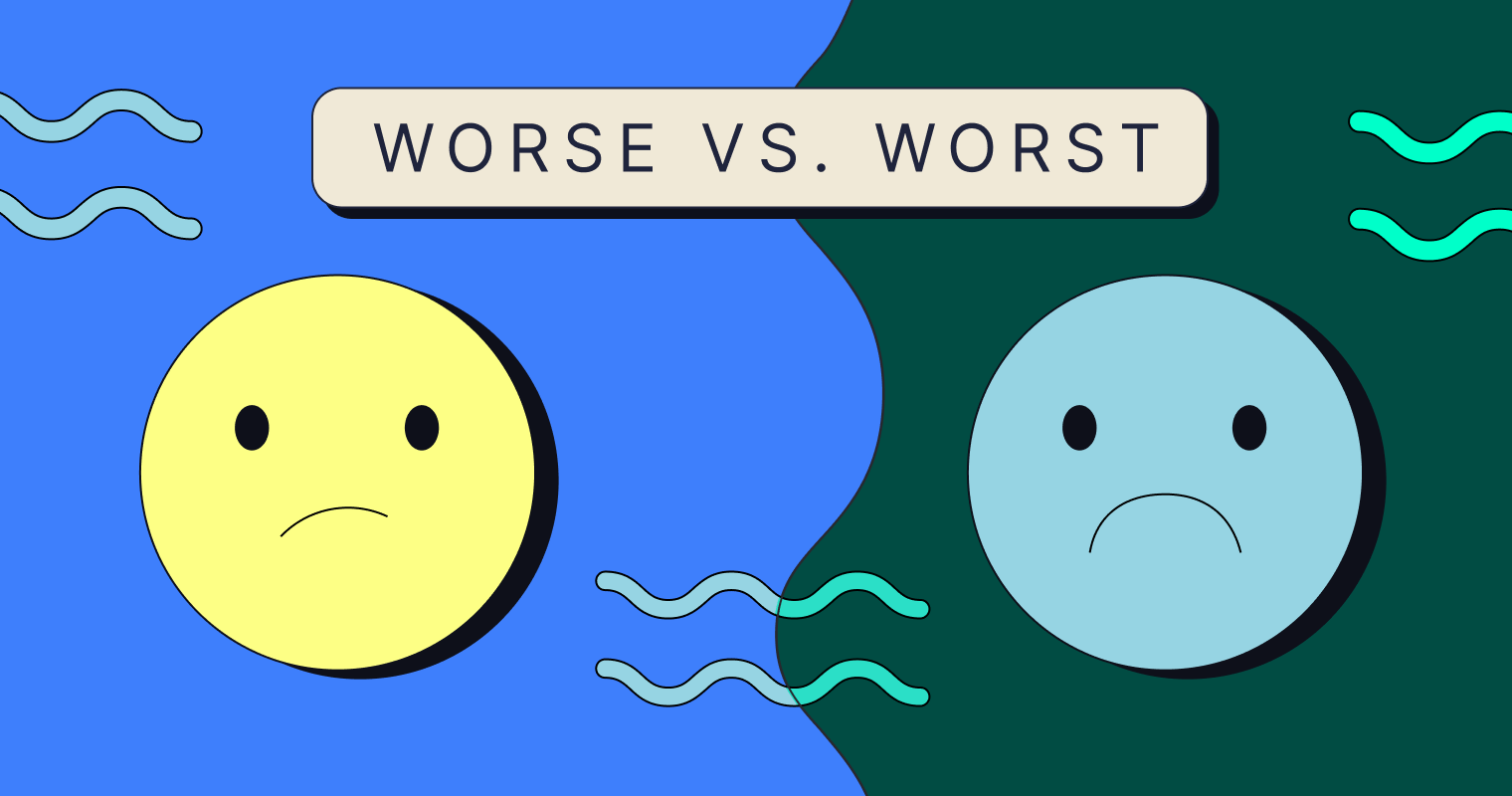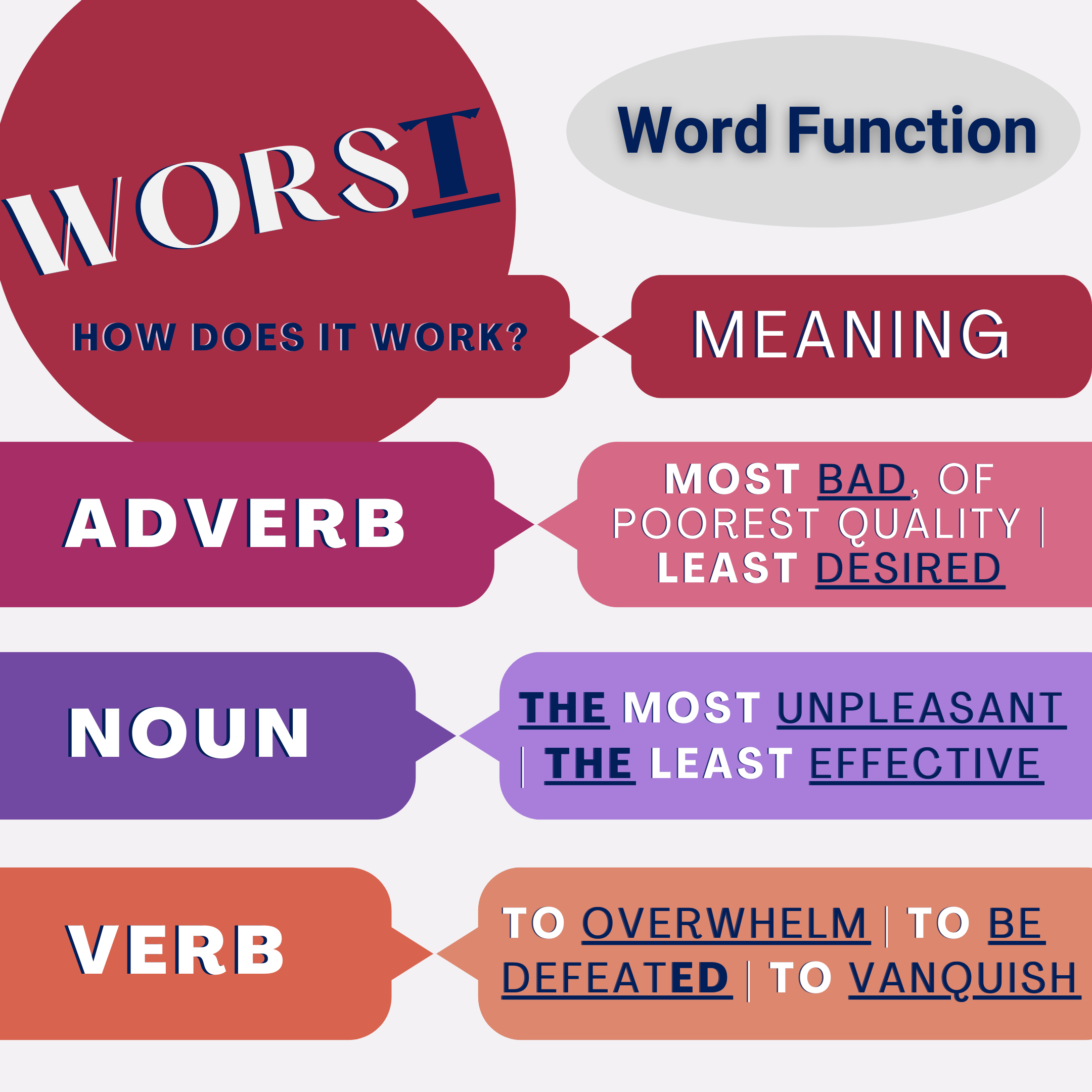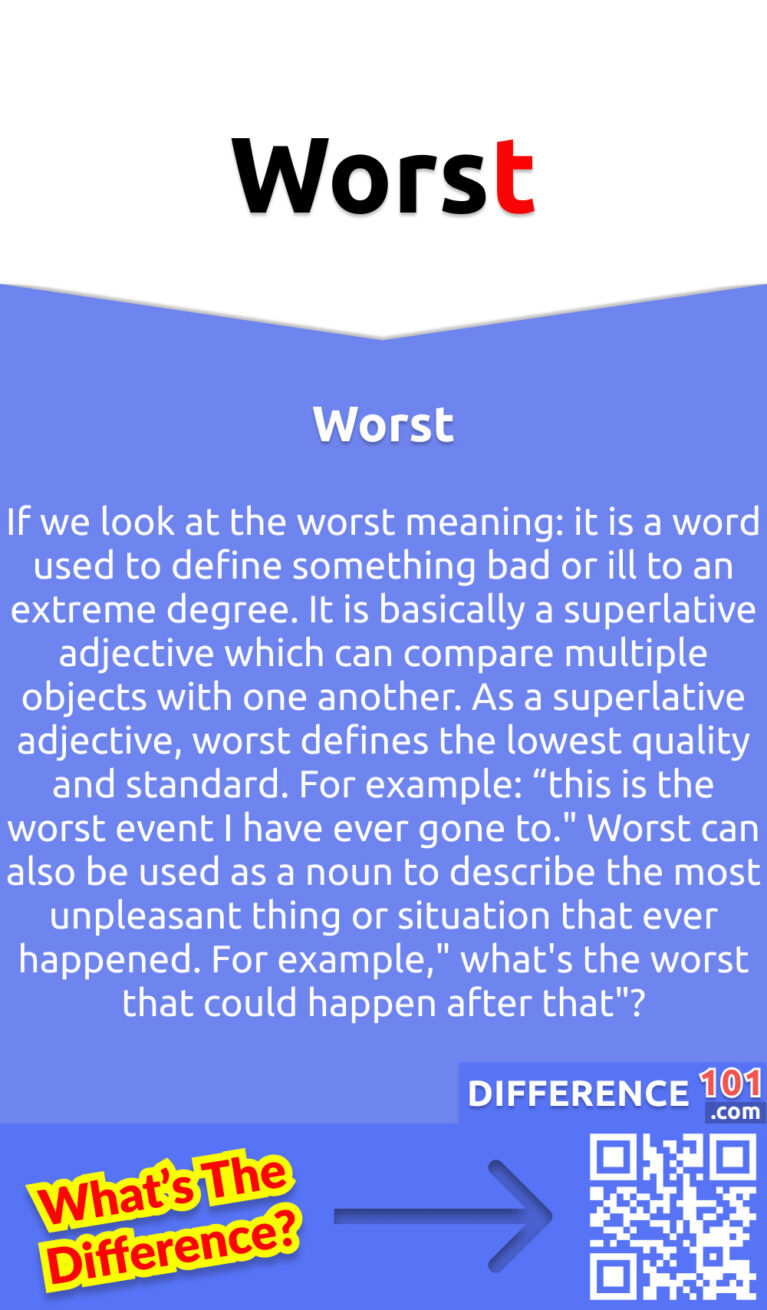Unpacking The Idea Of Florida's Worst Cities: What To Know
When people talk about the “worst” cities in Florida, it's almost a very interesting conversation, isn't it? The meaning of "worst" itself is quite broad, basically meaning "most corrupt, bad, evil, or ill," as my text points out. It refers to what is of the lowest quality, or the most unpleasant, difficult, or severe. So, when we consider cities, this term points to the least favorable outcomes or conditions a place might offer. It's not just about one thing, you know, but rather a combination of factors that can make a location seem less appealing compared to others in the Sunshine State.
You see, the idea of a "worst" city is, in a way, very subjective. What one person finds undesirable, another might actually find perfectly fine, or even charming. It really depends on what you value most in a place to live or visit. For some, it might be the cost of living that makes a city seem difficult, while for others, it could be the job market, or maybe even the general feeling of safety. As my text says, "worst" is the superlative form, meaning "most bad," but that "most bad" can be measured by different yardsticks, couldn't it?
This discussion isn't about pointing fingers at specific places, but more about understanding the different aspects that contribute to a city being perceived as less than ideal. We'll look at the common concerns that often lead people to label certain areas as challenging or, you know, less desirable. This way, you can consider these elements for yourself and decide what truly matters when you think about Florida's urban areas. It's about empowering you with information, so you can make your own informed choices, really.
- Mikkel Kessler Net Worth
- Ivanka Trump And Jared Kushner Made Hundreds Of Millions Of Dollars While Working In The White House
Table of Contents
- Understanding What Makes a City Challenging
- How Perceptions Change
- Frequently Asked Questions
- Making Your Own Assessment
Understanding What Makes a City Challenging
When people use the term "worst cities in FL," they are usually thinking about a collection of factors that, you know, just don't quite measure up to what they expect from a good place to live. It's not just one thing, but a combination of elements that can make daily life a bit more difficult, or perhaps less enjoyable. These factors can range from how easy it is to find work, to the general feeling of security in a neighborhood, or even the natural challenges a place faces. We're going to explore these different aspects, so you can get a clearer picture of what people mean when they talk about a city being "worst."
The Economic Picture
One of the main things that can make a city seem less desirable is its economic situation, actually. This includes a lot of different parts, like how many jobs are available, what those jobs pay, and how much it costs to live there. If a city has a high cost of living but the wages are low, that can create a lot of financial strain for residents, you know? It means people might struggle to afford housing, food, and other necessities, which can really impact their overall quality of life. A city with limited job opportunities, especially in diverse fields, might also be seen as challenging because it doesn't offer much room for career growth or stability. So, when folks consider a place "worst," the money side of things is often a big part of it, pretty much.
Think about housing, for example. If homes are incredibly expensive and rents are really high, it can push out long-time residents and make it tough for new people to move in, even if there are jobs. That's a very real concern for many, isn't it? Then there's the job market itself. A city might have jobs, but are they good-paying jobs that offer benefits and long-term prospects? Or are they mostly lower-wage service jobs that don't provide much financial security? These are the kinds of questions that come up when people assess the economic health of a place. A city that struggles with these economic indicators can, in some respects, be seen as less favorable for building a stable life, you know.
- A Palm Beach Property Once Owned By Donald Trump Just Sold For Close To 140 Million Second Most Expensive Sale In Us History
- Snap Cofounders Plan Sell 512m Shares Stock
Moreover, the diversity of a city's economy also plays a role. If a city relies too heavily on just one industry, it can be very vulnerable to economic downturns. If that industry struggles, the whole city feels the pinch, leading to job losses and financial hardship for many. This lack of economic resilience can make a place seem risky to live in, especially for families looking for stability. So, a city with a varied economic base, offering different types of work, is usually seen as more robust and less likely to face widespread financial difficulties. It’s a bit like putting all your eggs in one basket, isn’t it? When that basket drops, everything is affected, basically.
Safety and Community Well-Being
Another really big factor in how people perceive cities is safety and the general feeling of community well-being, naturally. This isn't just about crime rates, though those are certainly a part of it. It's also about how safe people feel walking around their neighborhoods, whether they feel their children can play outside, and the overall sense of order and peace. A city with a higher incidence of certain types of crime, or where residents frequently report feeling unsafe, might very well be considered "worst" by many. It impacts daily life in a very direct and personal way, doesn't it?
The type of crime matters too, you know. While all crime is concerning, a city with a higher prevalence of violent crime might be viewed more negatively than one with mostly property crime, for example. The constant worry about personal safety can create a stressful living environment, which detracts from the overall quality of life. This isn't just about statistics; it's about the lived experience of the people who call that city home. A community where people don't feel secure is, in a way, failing to provide a fundamental need for its residents, wouldn't you say?
Beyond crime, community well-being also includes things like the availability of social services, mental health support, and programs that help people connect and thrive. If these resources are lacking, or if there's a general sense of disconnection among residents, it can contribute to a city being seen as less supportive. A strong community often has places for people to gather, events that bring folks together, and a general spirit of mutual support. When these elements are missing, or are in short supply, it can make a city feel isolating or, you know, not as welcoming. So, the social fabric of a place is actually quite important, too it's almost.
Environmental Factors and Natural Risks
Florida, as you know, is a place with unique environmental characteristics, and these can sometimes contribute to a city being seen as "worst," in some respects. One of the most talked-about aspects is the risk of natural disasters, particularly hurricanes. Cities that are more frequently or severely impacted by these powerful storms can face significant challenges, like widespread damage, power outages, and the long, difficult process of rebuilding. This can be a very stressful and costly experience for residents, and it's a factor many people consider when choosing where to live, basically.
Beyond hurricanes, other environmental concerns can also play a role. Issues like flooding, rising sea levels, or even the quality of local water and air can make a city less appealing. If a city consistently struggles with these environmental challenges, it can impact public health, property values, and the general ease of living. For instance, areas prone to frequent flooding might require residents to carry higher insurance costs or deal with constant repairs, which is a bit of a burden, isn't it? These environmental realities are, naturally, outside of human control in many ways, but their impact on a city's livability is very real, you know.
Furthermore, the availability of green spaces, parks, and clean natural areas can also influence how a city is perceived. If a city lacks these amenities, or if its natural environment is heavily polluted or degraded, it can detract from the overall quality of life. People often seek places where they can enjoy nature, engage in outdoor activities, and simply breathe fresh air. A city that doesn't offer these opportunities, or where the environment is challenging, might be seen as less desirable for those who value such things. So, the natural surroundings and the risks associated with them are definitely part of the equation when people talk about the "worst cities in FL," too.
Quality of Life and Amenities
The overall quality of life and the availability of amenities are also very important when people think about what makes a city desirable, or, you know, "worst." This covers a wide range of things that contribute to daily living, like access to good schools, healthcare facilities, and recreational opportunities. If a city has struggling schools, or if it's difficult to get quality medical care, that can be a major concern for families and individuals alike. These are the basic services that people expect from a functioning community, aren't they?
Traffic congestion, noise pollution, and the general cleanliness of a city can also impact how people feel about living there. Spending hours stuck in traffic, or constantly being exposed to loud noises, can be incredibly frustrating and reduce one's enjoyment of their home environment. Similarly, a city that struggles with cleanliness or has a lot of visible blight might not feel like a pleasant place to be. These everyday experiences, while seemingly small, can really add up and influence a person's overall satisfaction with where they live, pretty much.
Moreover, the cultural and recreational offerings of a city play a role. Do people have access to museums, theaters, sports venues, or vibrant dining scenes? Is there a sense of community spirit, with local events and festivals? If a city lacks these kinds of amenities, or if there isn't much to do for entertainment and leisure, it might be seen as dull or uninspiring. People often look for places that offer a rich and engaging lifestyle, so a city that falls short in these areas could be considered less appealing. So, the general vibe and what there is to do for fun and enrichment are very much part of the conversation about "worst cities in FL," too it's almost.
How Perceptions Change
It's interesting to think about how perceptions of cities can shift over time, you know. What might have been considered a "worst" city in FL a few years ago could be undergoing significant improvements today. Cities are dynamic places, constantly evolving due to new developments, changes in leadership, economic shifts, or even community-led initiatives. A city that once struggled with high crime rates might have implemented effective community policing programs, leading to a noticeable drop in incidents and a renewed sense of safety among residents. So, what was once true might not be the case anymore, basically.
Economic conditions, for instance, are rarely static. A city that once had a stagnant job market might attract new industries or businesses, creating fresh opportunities and boosting the local economy. This can lead to increased investment, better infrastructure, and a general uplift in the quality of life for its residents. Conversely, a city that was once thriving could face new challenges, like a major industry leaving town, or a significant increase in the cost of living, which could then alter its appeal. These changes mean that the label of "worst" is never permanent, and it’s always worth looking at the current situation, isn't it?
Public perception is also heavily influenced by media coverage and word-of-mouth. A few negative stories, or even outdated information, can sometimes stick to a city for a long time, even if the reality on the ground has changed. This is why it's always a good idea to seek out current information and, if possible, experience a place for yourself before forming a strong opinion. The criteria we've discussed are helpful guidelines, but the actual lived experience can often tell a different story. So, keeping an open mind and looking at the most up-to-date information is really important when considering any city, especially when talking about the "worst cities in FL," you know.
Frequently Asked Questions
When people think about the "worst cities in FL," a few common questions often pop up, naturally. These questions usually try to get to the heart of what makes a place difficult to live in, or how to avoid such places. We'll try to address some of those here, giving you a bit more insight into the common concerns.
What makes a city "worst" in Florida?
A city is often considered "worst" in Florida based on a combination of factors, you know. These can include a high cost of living compared to average wages, limited job opportunities, higher crime rates, or a lack of essential services like quality schools and healthcare. Natural disaster risks, like frequent hurricanes or flooding, can also contribute to this perception, basically. It's about what makes daily life challenging or less appealing for the people who live there, in some respects.
Are there any safe and affordable cities in Florida?
Yes, there are definitely cities in Florida that are considered both safe and affordable, actually. Finding them often involves looking beyond the most popular or well-known destinations. These places might not have the same level of tourism or buzz, but they can offer a good quality of life with reasonable living expenses and lower crime rates. Researching smaller towns or less densely populated areas can often reveal hidden gems that fit this description, you know. Learn more about finding your ideal Florida spot on our site.
How do I research cities before moving to Florida?
When researching cities before moving to Florida, it's a good idea to look at several different data points, really. Check out statistics on crime rates, unemployment figures, and the cost of living, including housing prices. Also, look into the quality of local schools and healthcare facilities. Reading community forums, talking to residents, and, if possible, visiting the city yourself for an extended period can give you a much better feel for the place. You can also explore resources like city government websites and local news outlets for current information. For more tips, you can link to this page about moving to Florida, and you might find useful information on sites like the U.S. Census Bureau for demographic data, too it's almost.
Making Your Own Assessment
Ultimately, when you think about the "worst cities in FL," it really comes down to what matters most to you, you know. The criteria we've talked about—economic stability, safety, environmental concerns, and overall quality of life—are all important, but their weight can change depending on your personal circumstances and preferences. What one person prioritizes, another might not, and that's perfectly fine. Your definition of "worst" might be very different from someone else's, and that's the beauty of it, isn't it?
So, instead of relying solely on broad labels, consider using these factors as a framework for your own investigation. Think about your personal needs: Do you need a strong job market in a specific industry? Is safety your absolute top priority? Are you sensitive to environmental risks? By asking yourself these questions, you can tailor your search and identify places that truly align with what you're looking for in a home. This personalized approach is, in a way, the most effective path to finding a place that feels right for you, basically.
Remember that conditions can change, and a city's reputation is often a reflection of a moment in time. Staying informed with current data and, if possible, visiting potential locations can provide the most accurate picture. It's about gathering all the information you can, weighing the pros and cons based on your own values, and then making a choice that feels good for you and your family. That's how you really figure out what works, isn't it? And that's what truly matters when you're thinking about any city, whether people call it "worst" or "best," naturally.
- Sunglasses Tycoon Leonardo Del Vecchio Was Abandoned As A Child To An Orphanage Today Hes Worth 26 Billion
- Polands Newest Billionaire Cashes In On Pandemic Fueled E Commerce Frenzy To Join The Three Comma Club

301 Moved Permanently

worse vs worst what is the difference?

Worse vs. Worst: 7 Key Differences, Pros & Cons, Examples | Difference 101